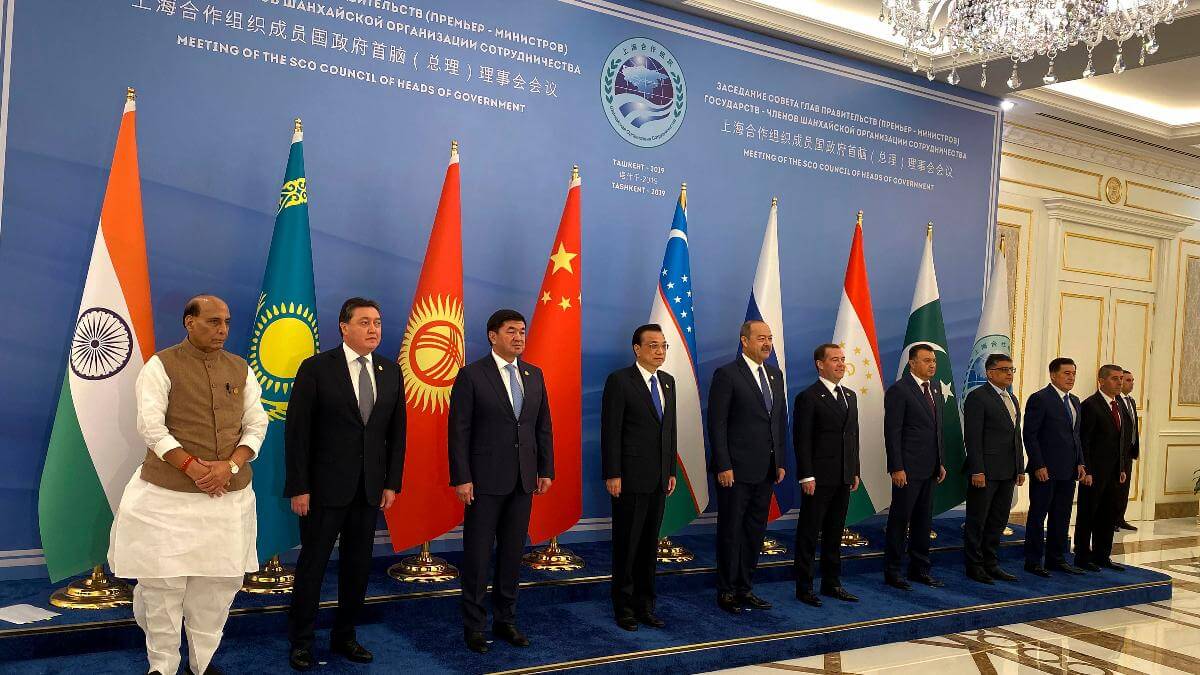On Monday, India hosted the Shanghai Cooperation Organisation’s Heads of Government (HoG) meeting. The statement released by the Indian Ministry of External Affairs said, “It will be the first time that a Summit-level Meeting will be held under India’s Chairmanship, since it gained full membership of the organisation in 2017.” The statement further said, “By Chairing the 19th meeting of the SCO Council of Heads of Government on 30 November, India hopes to further strengthen greater trade, economic and cultural cooperation within SCO by putting human beings at the centre of SCO activities and to foster greater peace and prosperity in the region.”
The meet, which focussed on the eight-member grouping’s trade and economic agenda, was attended by the Prime Ministers of Russia, Kyrgyzstan, Tajikistan, Uzbekistan and Kazakhstan. The Chinese Premier BRLi Keqiang also participate in the dialogue. Moreover, the discussion saw the participation of four observer states – Afghanistan, Iran, Belarus and Mongolia. India also invited representatives of Turkmenistan as special guests.
The Prime Ministers of both India and Pakistan, however, did not attend the meet. Officials from the Ministry of External Affairs said that while the HoG meetings are generally attended by the countries’ Prime Ministers, Indian premier Narendra Modi had already attended the “Heads of State” meet in November. Moreover, since its induction into the group, the HoG meeting has always been attended by a representative of the Prime Minister. While in 2017 and 2018, Narendra Modi was represented by the External Affairs Minister, the 2019 meet was attended by Defence Minister Rajnath Singh. This year, Vice-President Venkaiah Naidu attended and chaired the HoG meeting.
Similarly, Pakistani Prime Minister Imran Khan, too, did not attend Monday’s meet. While he was a participant in the Head of State meeting held earlier, India’s chairmanship of the HoG meet is the likely reason for Khan’s decision. He was represented by the Secretary for Foreign Affairs.
During his opening statement, Vice President Naidu, without specifically naming Pakistan, said, “India condemns terrorism in all its manifestations. We remain concerned about threats emerging from ungoverned spaces and are particularly concerned about states that leverage terrorism as an instrument of state policy.” He also criticised attempts by some members to raise bilateral issues into the grouping, which he believed to be in violation of the “well-established principles and norms of the SCO charter safeguarding the sovereignty and territorial integrity of SCO member states.” This was in reference to Pakistan’s repeated attempts to raise its ongoing dispute with India in Kashmir in several multilateral organisations. During the SCO’s National Security Advisors’ meet held in September Indian NSA Ajit Doval walked out after his Pakistani counterpart displayed the country’s “new” map depicting Indian territory as its own. Anurag Srivastava, the spokesperson for India’s Ministry of External Affairs (MEA), said that the Pakistani NSA “deliberately projected a fictitious map that Pakistan has recently been propagating”, further adding that Pakistan proceeded to, expectedly, “present a misleading view of this meeting.”
During the meeting, the leaders also stressed on the importance of introducing reforms to key multilateral organisations such as the World Trade Organisation and to create a “space of broad, open, mutually beneficial and equal interaction in Eurasia.” Further, at the end of the meet, all members, excluding India, issued a joint statement reiterating their support for China’s “One Belt and One Road” (OBOR) initiative. India has consistently opposed this Chinese venture as the China Pakistan Economic Corridor, which is a part of this project, crosses through Pakistan-occupied Kashmir.
India Chairs SCO Heads of Government Virtual Meet
On Monday, the leaders of the Shanghai Cooperation Organisation convened for a virtual discussion on the eight-member grouping’s trade and economic agenda. Read more:
December 1, 2020

18th Meeting of the Council Of Heads of Government of member States of the SCO held in 2019 SOURCE: ORIENTAL REVIEW
